Healthy Aging Strategies: A Guide to Thriving Later in Life
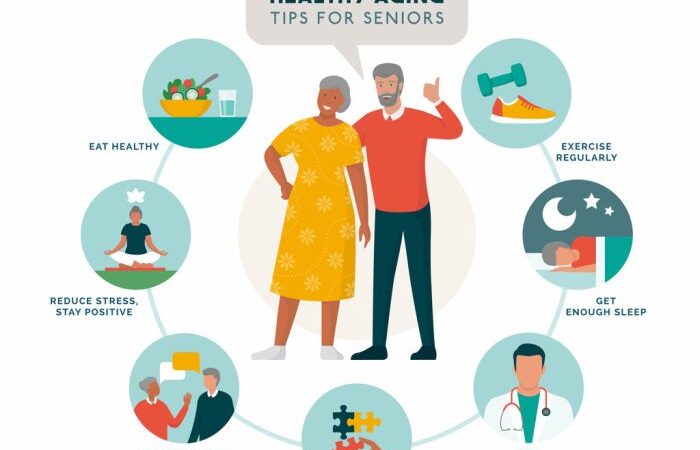
Healthy aging strategies take center stage, offering a roadmap to a fulfilling and vibrant later life. This comprehensive guide delves into the multifaceted aspects of healthy aging, encompassing lifestyle modifications, nutrition, physical activity, cognitive health, social connection, and medical considerations.
We’ll explore how to maintain physical, cognitive, and social well-being, ultimately empowering you to embrace the aging process with vitality and purpose.
By understanding the key factors that contribute to successful aging, we can make informed choices that promote longevity and quality of life. From incorporating nutritious foods and regular exercise into our daily routines to fostering meaningful social connections and managing stress effectively, we can actively shape our aging journey.
This guide serves as a valuable resource for individuals seeking to navigate the challenges and opportunities of aging gracefully and with resilience.
Understanding Healthy Aging
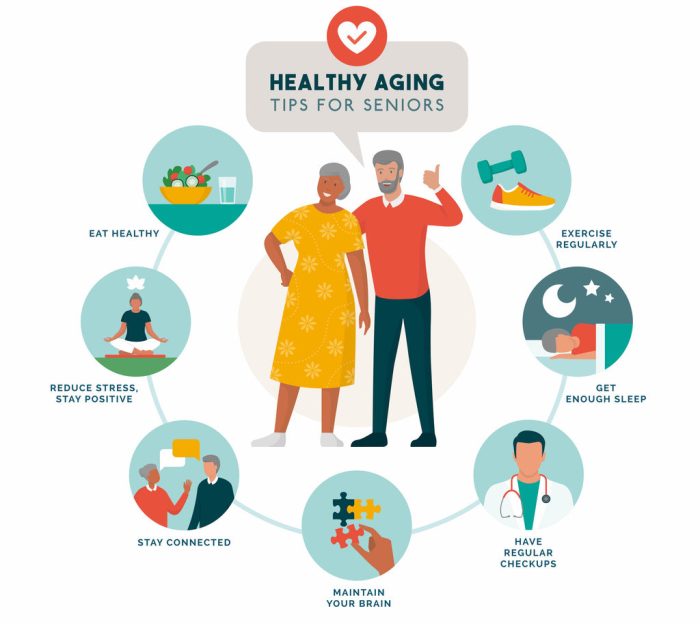
Healthy aging is not merely about living longer; it’s about living well for as long as possible. This involves maintaining physical, cognitive, and social well-being throughout life. It’s about embracing a holistic approach that encompasses both internal health and external factors, leading to a fulfilling and vibrant life.
Key Factors Contributing to Successful Aging
The key factors contributing to successful aging are multifaceted and interconnected. These factors play a crucial role in shaping an individual’s overall health and well-being, contributing to a fulfilling and active later life.
- Healthy Lifestyle: A healthy lifestyle is foundational to successful aging. It involves a balanced diet rich in fruits, vegetables, and whole grains, regular physical activity, and adequate sleep.
- Social Connections: Strong social connections are vital for maintaining mental and emotional well-being. Social engagement through family, friends, and community activities provides a sense of purpose and belonging, reducing feelings of isolation and loneliness.
- Cognitive Stimulation: Engaging in mentally stimulating activities, such as reading, learning new skills, or playing games, helps keep the brain sharp and reduces the risk of cognitive decline.
- Stress Management: Chronic stress can negatively impact both physical and mental health. Developing healthy coping mechanisms, such as mindfulness, meditation, or spending time in nature, can help manage stress levels.
- Early Prevention and Management of Chronic Diseases: Early detection and management of chronic conditions like diabetes, heart disease, and arthritis can significantly impact longevity and quality of life.
Chronological Age vs. Biological Age
Chronological age refers to the number of years a person has lived. In contrast, biological age reflects the actual age of a person’s body based on various physiological markers, such as blood pressure, cholesterol levels, and muscle mass. These markers can be influenced by lifestyle choices and genetic factors.
For instance, an individual who smokes has a sedentary lifestyle and consumes a diet high in processed foods may have a biological age older than their chronological age. Conversely, someone who maintains a healthy lifestyle may have a biological age younger than their chronological age.
Lifestyle Factors
Lifestyle factors play a significant role in promoting healthy aging. By adopting healthy habits, you can enhance your physical, mental, and emotional well-being, increasing your chances of living a longer and healthier life.
Diet
A balanced diet rich in fruits, vegetables, whole grains, and lean protein is crucial for healthy aging.
- Fruits and vegetables are rich in antioxidants, vitamins, and minerals that protect against chronic diseases and promote cellular health.
- Whole grains provide fiber, which helps regulate blood sugar levels, supports gut health, and reduces the risk of heart disease.
- Lean protein is essential for maintaining muscle mass and bone density, which decline with age.
It’s important to limit processed foods, sugary drinks, and unhealthy fats, which can contribute to weight gain, inflammation, and chronic diseases.
Exercise
Regular physical activity is essential for maintaining physical function and cognitive health as we age.
- Aerobic exercise, such as brisk walking, swimming, or cycling, improves cardiovascular health, strengthens lungs, and boosts energy levels.
- Strength training helps maintain muscle mass and bone density, preventing falls and fractures.
- Balance exercises improve coordination and stability, reducing the risk of falls.
Aim for at least 150 minutes of moderate-intensity aerobic activity or 75 minutes of vigorous-intensity aerobic activity per week, along with strength training exercises at least twice a week.
Sleep
Getting enough quality sleep is essential for physical and mental health.
- Adequate sleep allows the body to repair and rejuvenate, promoting healthy immune function and cognitive performance.
- Chronic sleep deprivation can increase the risk of chronic diseases, such as heart disease, diabetes, and obesity.
Most adults need 7-9 hours of sleep per night. Establishing a regular sleep schedule, creating a relaxing bedtime routine, and optimizing your sleep environment can help improve sleep quality.
Stress Management
Chronic stress can have detrimental effects on physical and mental health.
- Stress management techniques, such as yoga, meditation, or deep breathing exercises, can help reduce stress levels and promote relaxation.
- Social support from friends and family can provide a buffer against stress and promote emotional well-being.
Finding healthy ways to manage stress is essential for healthy aging.
Sample Daily Routine
Here’s a sample daily routine that incorporates healthy aging practices:
- Morning: Start the day with a healthy breakfast rich in protein and fiber, followed by 30 minutes of moderate-intensity exercise.
- Afternoon: Enjoy a balanced lunch with plenty of fruits and vegetables. Take a short break to engage in a relaxing activity, such as reading or listening to music.
- Evening: Have a light dinner and avoid large meals close to bedtime. Engage in a calming activity, such as taking a warm bath or reading a book, before going to bed. Aim for 7-9 hours of sleep.
Nutrition for Healthy Aging

Maintaining a healthy diet is crucial for overall well-being, especially as we age. Proper nutrition plays a vital role in supporting our physical and cognitive functions, reducing the risk of chronic diseases, and enhancing our quality of life.
Essential Nutrients for Healthy Aging
As we age, our bodies have different nutritional needs. Certain nutrients become particularly important for maintaining optimal health. The following table Artikels essential nutrients and their sources:
| Nutrient | Benefits | Sources |
|---|---|---|
| Protein | Supports muscle mass, bone health, and immune function. | Lean meats, poultry, fish, eggs, beans, lentils, tofu, nuts, and seeds. |
| Calcium | Essential for bone health, and preventing osteoporosis. | Dairy products, leafy green vegetables, fortified foods, sardines, salmon. |
| Vitamin D | Promotes calcium absorption, supports bone health, and may reduce the risk of certain cancers. | Sunlight exposure, fatty fish, egg yolks, fortified foods. |
| Vitamin B12 | Essential for nerve function, red blood cell production, and cognitive health. | Meat, poultry, fish, eggs, dairy products, fortified foods. |
| Fiber | Supports digestive health, regulates blood sugar levels, and may reduce the risk of heart disease. | Fruits, vegetables, whole grains, legumes. |
| Omega-3 Fatty Acids | Support heart health, and brain function, and reduce inflammation. | Fatty fish, flaxseeds, chia seeds, walnuts. |
Tips for Maintaining a Balanced Diet
Here are some tips for maintaining a balanced diet that supports optimal health in later life:
- Focus on whole, unprocessed foods: Prioritize fruits, vegetables, whole grains, lean protein sources, and healthy fats.
- Limit processed foods, sugary drinks, and unhealthy fats: These contribute to weight gain, inflammation, and chronic diseases.
- Stay hydrated: Drink plenty of water throughout the day. Older adults are more susceptible to dehydration.
- Eat regular meals: Avoid skipping meals, as this can lead to low blood sugar and fatigue.
- Cook at home more often: This allows you to control the ingredients and portion sizes.
- Consider consulting a registered dietitian: A dietitian can provide personalized advice based on your individual needs and health conditions.
The Mediterranean Diet and Healthy Aging
The Mediterranean diet, characterized by its emphasis on fruits, vegetables, whole grains, olive oil, fish, and legumes, has been linked to numerous health benefits, including reduced risk of heart disease, stroke, and certain types of cancer. This dietary pattern is often cited as a model for healthy aging due to its emphasis on nutrient-rich foods and its avoidance of processed foods and excessive amounts of saturated and unhealthy fats.
Physical Activity
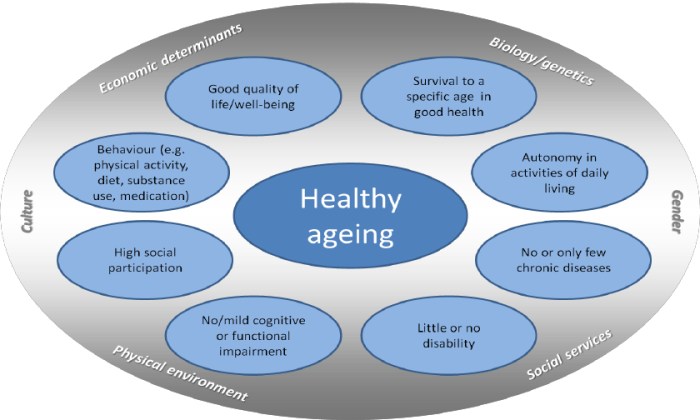
Regular exercise is crucial for healthy aging, offering numerous physical and mental benefits. It helps maintain physical function, reduces the risk of chronic diseases, and improves overall well-being.
Benefits of Exercise for Older Adults
Regular physical activity provides a wide range of benefits for older adults, including:
- Improved Cardiovascular Health: Exercise strengthens the heart and lungs, lowering blood pressure and improving cholesterol levels, reducing the risk of heart disease and stroke.
- Enhanced Muscle Strength and Bone Density: Strength training helps maintain and increase muscle mass, which is essential for mobility, balance, and preventing falls. It also strengthens bones, reducing the risk of osteoporosis and fractures.
- Increased Flexibility and Balance: Flexibility exercises improve range of motion and balance, making it easier to perform daily activities and reducing the risk of falls.
- Improved Mood and Cognitive Function: Exercise releases endorphins, which have mood-boosting effects. It also improves blood flow to the brain, enhancing cognitive function and reducing the risk of dementia.
- Weight Management: Exercise helps burn calories and maintain a healthy weight, which is crucial for overall health and reducing the risk of obesity-related diseases.
- Improved Sleep Quality: Regular physical activity can promote better sleep quality and reduce the risk of insomnia.
Age-Appropriate Exercise Recommendations
The type and intensity of exercise should be tailored to individual fitness levels and health conditions. It’s essential to consult with a healthcare professional before starting any new exercise program.
Strength Training
Strength training involves using resistance to build muscle mass and strength. Examples include:
- Weightlifting: Using free weights, machines, or resistance bands to perform exercises like squats, lunges, rows, and presses.
- Bodyweight Exercises: Using your body weight for resistance, such as push-ups, planks, and squats.
Cardiovascular Exercise
Cardiovascular exercise, also known as aerobic exercise, strengthens the heart and lungs. Examples include:
- Walking: A low-impact activity that can be easily incorporated into daily life. Aim for at least 30 minutes of brisk walking most days of the week.
- Swimming: A great option for those with joint pain or injuries, as it’s low-impact and provides a full-body workout.
- Cycling: A fun and effective way to get cardiovascular exercise. Choose a flat route or use an indoor stationary bike for a lower-impact option.
- Dancing: A fun and engaging way to get moving, which can improve coordination and balance.
Flexibility Exercises
Flexibility exercises improve the range of motion and reduce the risk of injury. Examples include:
- Stretching: Holding a stretch for 15-30 seconds, focusing on major muscle groups like the legs, back, and shoulders.
- Yoga: A combination of stretching, strength training, and mindfulness techniques.
- Tai Chi: A gentle form of exercise that involves slow, flowing movements and deep breathing.
Sample Exercise Program
Here’s a sample exercise program for individuals with different fitness levels:
Beginner
- Strength Training: 2 days per week, 1 set of 10-12 repetitions of each exercise.
- Cardiovascular Exercise: 3 days per week, 30 minutes of moderate-intensity activity, such as brisk walking or cycling.
- Flexibility Exercises: 3 days per week, 10-15 minutes of stretching or yoga.
Intermediate
- Strength Training: 2-3 days per week, 2 sets of 10-12 repetitions of each exercise.
- Cardiovascular Exercise: 3-4 days per week, 45 minutes of moderate-intensity activity or 30 minutes of vigorous-intensity activity.
- Flexibility Exercises: 3-4 days per week, 15-20 minutes of stretching or yoga.
Advanced
- Strength Training: 3-4 days per week, 3 sets of 10-12 repetitions of each exercise.
- Cardiovascular Exercise: 4-5 days per week, 60 minutes of moderate-intensity activity or 45 minutes of vigorous-intensity activity.
- Flexibility Exercises: 4-5 days per week, 20-30 minutes of stretching or yoga.
It’s important to listen to your body and gradually increase the intensity and duration of your workouts as you get stronger.
Cognitive Health
Cognitive health is an essential aspect of healthy aging, encompassing the ability to think, learn, remember, and solve problems. Maintaining good cognitive function as we age allows us to enjoy a fulfilling and independent life. While some decline in cognitive abilities is natural with age, there are several strategies we can adopt to preserve and enhance our mental sharpness.
Strategies to Maintain Cognitive Health
Maintaining cognitive health involves adopting a holistic approach that addresses various aspects of our lives. Here are some key strategies:
- Engage in mentally stimulating activities: Challenging your brain regularly is crucial for maintaining cognitive function. Activities like puzzles, crosswords, Sudoku, and brain training games can help strengthen your cognitive abilities. Reading, learning a new language, playing musical instruments, and engaging in creative hobbies also stimulate the brain and enhance cognitive flexibility.
- Stay socially active: Social interaction is essential for cognitive health. Engaging in meaningful conversations, joining social groups, volunteering, and participating in community activities can help maintain cognitive function by promoting mental stimulation and reducing social isolation.
- Maintain a healthy lifestyle: A healthy lifestyle plays a crucial role in cognitive health. Eating a balanced diet rich in fruits, vegetables, and whole grains provides essential nutrients for brain function. Regular physical activity improves blood flow to the brain, promoting cognitive health.Getting enough sleep is also vital for cognitive function, allowing the brain to consolidate memories and rest.
- Manage stress: Chronic stress can negatively impact cognitive function. Stress management techniques such as meditation, yoga, deep breathing exercises, and spending time in nature can help reduce stress levels and promote cognitive well-being.
Benefits of Brain Training Programs
Brain training programs are designed to challenge cognitive skills, such as memory, attention, and processing speed. These programs often involve engaging in a series of exercises or games that gradually increase in difficulty. While research on the long-term benefits of brain training is ongoing, studies suggest that these programs may:
- Improve cognitive performance: Brain training programs can help improve cognitive performance in areas such as memory, attention, and processing speed. This improvement can translate to better daily functioning and overall cognitive health.
- Delay cognitive decline: Some studies suggest that brain training may help delay the onset of cognitive decline associated with aging. By challenging the brain and promoting neuroplasticity, these programs may help maintain cognitive function for a longer period.
- Enhance mental well-being: Brain training programs can provide a sense of accomplishment and boost self-esteem, contributing to overall mental well-being.
Social Connection and Mental Well-being: Healthy Aging Strategies
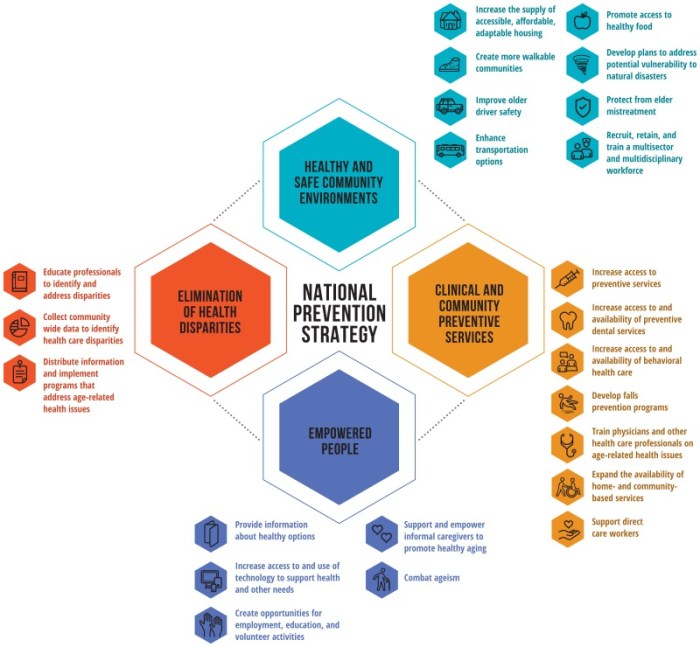
Social connections play a vital role in healthy aging, contributing significantly to mental health and overall well-being. Strong social relationships provide a sense of purpose, belonging, and support, which are essential for navigating the challenges of later life.
The Importance of Social Connections
Social connections are crucial for mental health and well-being in later life. Studies have shown that individuals with strong social networks tend to have better cognitive function, lower rates of depression, and a greater sense of life satisfaction.
Strategies for Fostering Social Connections
Fostering social connections is an active process that requires effort and intentionality.
- Engage in activities you enjoy: Participating in activities that align with your interests and hobbies can provide opportunities to connect with like-minded individuals. Joining a book club, taking a dance class, or volunteering for a cause you care about can help you meet new people and build relationships.
- Reach out to friends and family: Regularly connecting with loved ones, whether through phone calls, video chats, or in-person visits, can help maintain strong bonds and provide emotional support.
- Join a community group: Joining a local community group, such as a senior center, church group, or neighborhood association, can provide a sense of belonging and opportunities for social interaction.
- Use technology to stay connected: Social media platforms, online forums, and video conferencing tools can help you stay connected with friends and family, even if you are physically distanced.
Combating Loneliness
Loneliness is a common experience in later life, but it can be addressed through proactive strategies.
- Identify your social needs: Reflect on your social needs and identify ways to meet them. This may involve joining a club, volunteering, or simply making more of an effort to connect with friends and family.
- Challenge negative thoughts: Loneliness can often be fueled by negative thoughts. Challenge these thoughts by focusing on the positive aspects of your life and the people you care about.
- Seek professional help: If you are struggling with loneliness, don’t hesitate to seek professional help. Therapists can provide guidance and support in developing strategies for coping with loneliness and building stronger social connections.
Emotional Well-being and Healthy Aging
Emotional well-being is an essential component of healthy aging. Managing stress and anxiety is crucial for maintaining a positive outlook and promoting overall well-being.
Techniques for Managing Stress and Anxiety
Stress and anxiety are common experiences, but there are effective techniques for managing them.
- Practice mindfulness and relaxation techniques: Techniques such as deep breathing, meditation, and yoga can help calm the mind and reduce stress.
- Engage in physical activity: Exercise has been shown to have mood-boosting effects and can help reduce stress and anxiety.
- Get enough sleep: Adequate sleep is essential for both physical and mental well-being. Aim for 7-8 hours of sleep per night.
- Connect with nature: Spending time in nature has been shown to reduce stress and improve mood.
- Seek professional support: If you are struggling to manage stress and anxiety, don’t hesitate to seek professional help. Therapists can provide guidance and support in developing coping mechanisms.
Medical Considerations
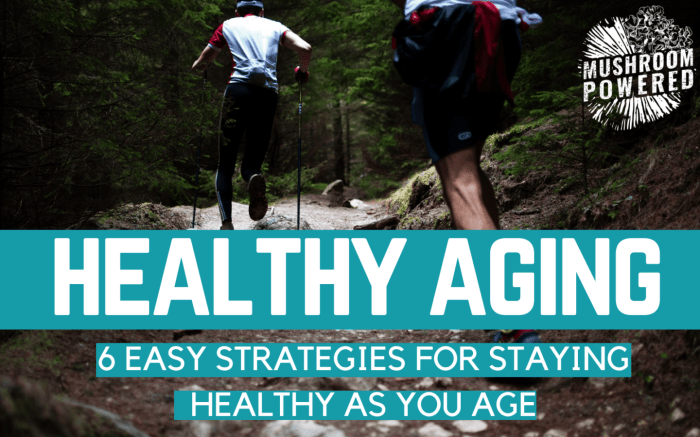
As we age, our bodies undergo various changes that can increase our susceptibility to certain health conditions. It’s crucial to be proactive in managing these changes and seeking appropriate medical care.
Common Health Concerns in Older Adults
Older adults are more likely to experience chronic diseases, age-related changes, and other health issues that can impact their overall well-being.
- Chronic Diseases: Chronic diseases, such as heart disease, stroke, diabetes, arthritis, and cancer, are more prevalent in older adults. These conditions often require ongoing management and can significantly affect quality of life.
- Age-Related Changes: As we age, our bodies naturally undergo changes that can make us more vulnerable to certain health problems. These changes include decreased muscle mass, bone density, and immune function, as well as changes in vision, hearing, and cognitive abilities.
- Other Health Concerns: Older adults may also experience other health issues, such as falls, urinary incontinence, and sleep disturbances, which can impact their independence and quality of life.
Importance of Regular Medical Checkups and Preventive Screenings
Regular medical checkups and preventive screenings are essential for maintaining good health as we age. These visits allow healthcare providers to identify potential health problems early when they are often easier to treat.
- Early Detection and Prevention: Early detection and prevention are key to managing health conditions effectively. Regular medical checkups can help identify health problems before they become serious, allowing for timely intervention and treatment.
- Personalized Care: Medical checkups provide an opportunity for healthcare providers to assess individual health needs and develop personalized care plans that address specific concerns and risk factors.
- Lifestyle Modifications: Medical checkups can also help identify areas where lifestyle modifications, such as diet, exercise, and stress management, can improve overall health and well-being.
Role of Medication and Treatment Options
Medication and treatment options play a vital role in managing health conditions in older adults.
- Managing Chronic Diseases: Medications are often essential for managing chronic diseases, such as diabetes, heart disease, and high blood pressure, helping to control symptoms and prevent complications.
- Treating Acute Conditions: Medications and other treatments can also be used to treat acute conditions, such as infections, injuries, and flare-ups of chronic diseases.
- Maintaining Quality of Life: Treatment options can help older adults maintain their independence, mobility, and overall quality of life, even when facing health challenges.
Resources and Support
Navigating the aging process can be made easier with access to the right resources and support systems. Whether it’s seeking healthcare, joining community programs, or connecting with loved ones, various avenues can enhance your well-being and empower you to thrive in your later years.
Healthcare Providers
It’s crucial to establish a strong relationship with healthcare providers who understand your needs and can provide personalized care.
- Primary Care Physician: Your primary care physician acts as your first point of contact for health concerns. They can manage chronic conditions, conduct regular checkups, and refer you to specialists when necessary.
- Geriatrician: A geriatrician specializes in the health and well-being of older adults. They can address age-related changes, manage complex conditions, and provide comprehensive care plans.
- Other Specialists: Depending on your specific needs, you may require the services of other specialists, such as cardiologists, ophthalmologists, or endocrinologists.
Community Programs, Healthy aging strategies
Local communities offer a wide range of programs designed to support older adults, promoting social engagement, physical activity, and overall well-being.
- Senior Centers: Senior centers provide a welcoming space for socializing, participating in activities, and accessing resources. They often offer programs like fitness classes, educational workshops, and social outings.
- Community Health Centers: Community health centers offer affordable healthcare services, including preventive care, chronic disease management, and mental health support.
- Home-Delivered Meals: Programs that deliver meals to homebound individuals ensure nutritional needs are met, particularly for those with limited mobility.
Family and Friends
The support of family and friends plays a vital role in healthy aging. Their presence can provide emotional comfort, practical assistance, and a sense of belonging.
- Emotional Support: Loved ones can offer a listening ear, encourage, and help you cope with life’s challenges.
- Practical Assistance: Family and friends can assist with tasks such as transportation, grocery shopping, or home maintenance, especially when mobility becomes limited.
- Social Connection: Regular interaction with loved ones helps maintain social connections and combats feelings of isolation.
Navigating the Healthcare System
The healthcare system can be complex, but understanding the process can make accessing care more manageable.
- Health Insurance: Ensure you understand your health insurance coverage, including deductibles, co-pays, and benefits. Contact your insurance provider for clarification if needed.
- Medicare and Medicaid: If you are eligible, Medicare and Medicaid can provide significant financial assistance for healthcare expenses.
- Patient Advocacy Groups: Organizations dedicated to patient advocacy can provide information, support, and resources to help you navigate the healthcare system.
Conclusion
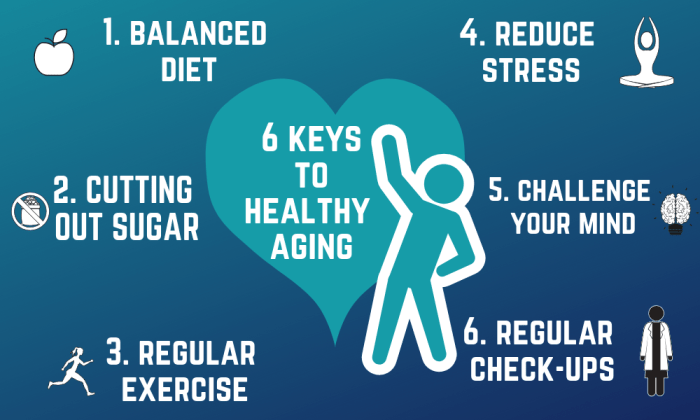
As we embark on the journey of healthy aging, it’s essential to remember that this is a continuous process of learning, adapting, and embracing change. By prioritizing our well-being, nurturing our minds and bodies, and fostering meaningful connections, we can unlock the potential for a fulfilling and enriching later life.
Let’s embrace the challenges and celebrate the opportunities that come with aging, knowing that every step we take towards a healthier lifestyle contributes to a brighter future.
Comments are closed.